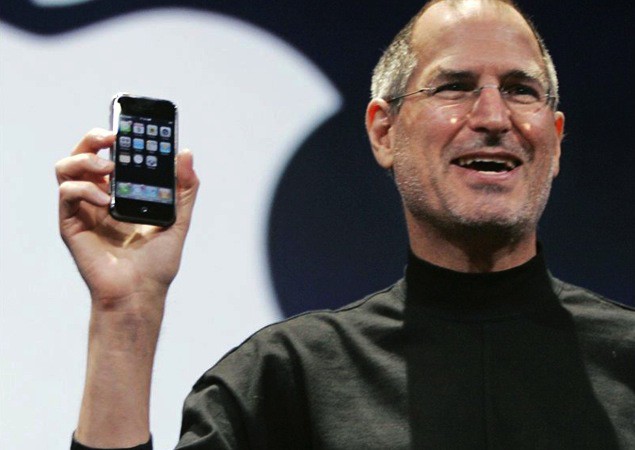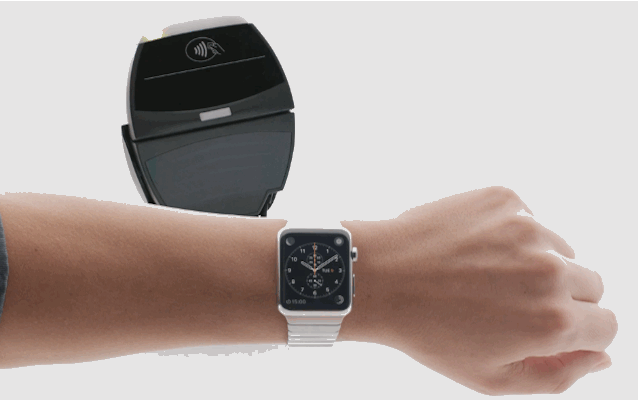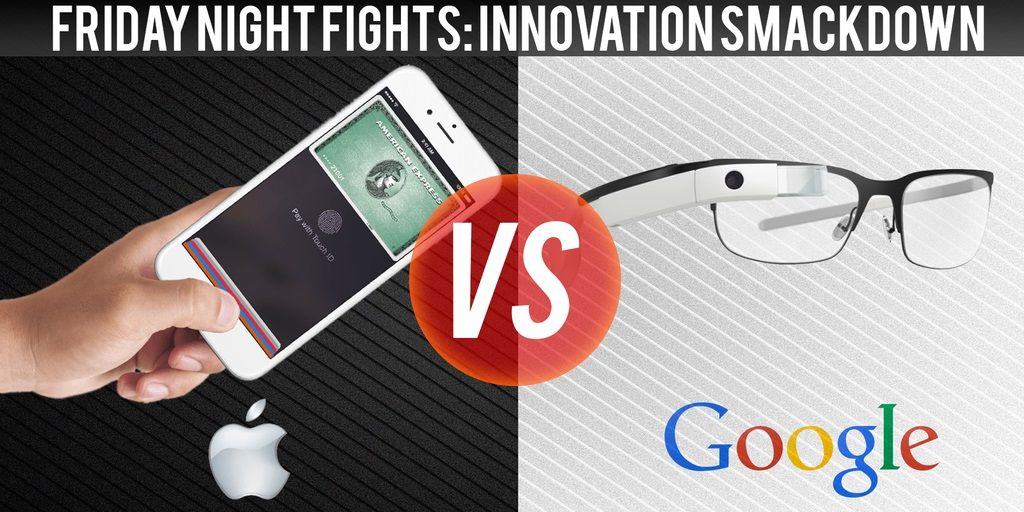To succeed in tech, you must be a master of innovation. No two companies understand this better than Apple and Google, which have become kings of the industry thanks to a string of incredible ideas that have shaped the technology we rely on today.
 But which company is continuing to innovate in 2015? Is it Apple, with its fitness-focused Apple Watch, Apple Pay, and a new streaming service that hopes to save the music industry? Or is it Google, with Google Glass, self-driving cars, and secret robots?
But which company is continuing to innovate in 2015? Is it Apple, with its fitness-focused Apple Watch, Apple Pay, and a new streaming service that hopes to save the music industry? Or is it Google, with Google Glass, self-driving cars, and secret robots?
Join us as we take it to a debate in this week’s Friday Night Fight between Cult of Android and Cult of Mac.
 Killian Bell (Cult of Android): It’s Friday, Friday, gotta get fighting on Friday. Everybody’s lookin’ forward to the weekend, weekend, Friday, Friday. Gettin’ down on Friday, everybody’s lookin’ forward to Friday… Night Fights!
Killian Bell (Cult of Android): It’s Friday, Friday, gotta get fighting on Friday. Everybody’s lookin’ forward to the weekend, weekend, Friday, Friday. Gettin’ down on Friday, everybody’s lookin’ forward to Friday… Night Fights!
So, this week’s battle is about innovation. Many (mostly Android fans) have criticized Apple for not innovating enough in recent years, and I tend to think it’s difficult to argue with that. What would you say to those critics, Luke?
 Luke Dormehl (Cult of Mac): Ugh. If it isn’t the Rebecca Black of Cult of Android. I do give you credit for coming back for your weekly ass-whooping, though.
Luke Dormehl (Cult of Mac): Ugh. If it isn’t the Rebecca Black of Cult of Android. I do give you credit for coming back for your weekly ass-whooping, though.
If I read you correctly, Killian, you’re seriously arguing that Google out-innovates Apple. Look, I’m all for Google’s innovations. In some ways, Google is the Xerox PARC of the 2000s: a place with some incredibly smart people, enormous scope of research, a massive budget, and — most importantly — no pressing need to turn any of its bright ideas into immediate products.
From Google Glass to self-driving cars to ways of tracking the spread of epidemics through search results, Google is great at generating massive tech headlines. But innovation’s about more than just throwing ideas at the wall and seeing what sticks.
The difference between Apple and Google is that Apple’s innovations come out polished and ready to change the world — not glorified betas the company loses interest in after the first wave of excitement wears off.
More to the point, Apple’s innovations consistently make money. That’s more than I can say for Google.

Photo: Apple
 KB: Not glorified betas? I’m pretty sure that’s exactly what Siri was. And Maps. And now the Apple Watch to some extent.
KB: Not glorified betas? I’m pretty sure that’s exactly what Siri was. And Maps. And now the Apple Watch to some extent.
Apple’s innovations make money because everything with an Apple logo makes money. But when was the last time they launched a truly innovative product?
Google may not have launched its self-driving cars and Glass may have been a failure — but they are at least incredibly exciting projects that will shape the future of technology. And there are plenty of others, like its contact lenses that read blood sugar, balloons that deliver Internet to remote areas of the world, and robots.
Who doesn’t want a robot?
 LD: I’ll admit that I’d be first in line for an Apple-branded robot. You’re right about Siri, of course. That’s the only time in history I remember Apple publicly launching a product for the general public it explicitly described as a beta, although it’s turned out pretty darn well. But there’s no getting around the fact that what you’re talking about with Google’s dream-like innovations are exactly that: dreams.
LD: I’ll admit that I’d be first in line for an Apple-branded robot. You’re right about Siri, of course. That’s the only time in history I remember Apple publicly launching a product for the general public it explicitly described as a beta, although it’s turned out pretty darn well. But there’s no getting around the fact that what you’re talking about with Google’s dream-like innovations are exactly that: dreams.
I’m not claiming the self-driving car won’t be massive, or that Google Glass couldn’t live up to its early hype, but we should draw some distinctions here. What Apple does is to quietly perfect its innovations and release them fully-formed into the world. They “just work” — and for most people that’s enough to count Apple as an innovative company.
Google’s a bit like that guy you know who’s always telling you about the novel he’s going to write. He’s got a great idea for it, but over time it just doesn’t seem to go anywhere. If we’re judging innovation by what makes money, then the last time Google seriously innovated was in 2000 when it came up with AdWords, which is how the company still makes 96% of its cash.
Besides, when it comes to the tired argument that Apple doesn’t innovate, haven’t haters been unsuccessfully trying to argue the same thing since 2011?
 KB: Siri was the only product described as a beta, but Maps might as well have been. So, which of Google’s innovations didn’t work out?
KB: Siri was the only product described as a beta, but Maps might as well have been. So, which of Google’s innovations didn’t work out?
I know you’re going to say Glass, but let’s not forget that that never really launched properly to consumers. It was available to “Explorers” who needed an invite until very late on, and it was always marketed as an experimental device. It was also available in the U.S. only for most of the time, though it did go on sale in the U.K. for a short time.
Other innovations like Android, Google Now, Chrome OS, and, of course, Google Search have been wildly successful.

Photo: Google
 LD: No-one’s going to argue that Google search has become massive to the point where it’s extremely difficult for another search engine to rival it in the marketplace. If we had more time — and it wasn’t a Friday where the goal is to get out of work as soon as possible — I think we could have a good discussion about the degree to which Google search was a case of “right time, right place.” How inevitable was PageRank in retrospect?
LD: No-one’s going to argue that Google search has become massive to the point where it’s extremely difficult for another search engine to rival it in the marketplace. If we had more time — and it wasn’t a Friday where the goal is to get out of work as soon as possible — I think we could have a good discussion about the degree to which Google search was a case of “right time, right place.” How inevitable was PageRank in retrospect?
But even if we applaud search, Google’s other innovations have been extremely hit and miss. Or, in the case of something like Android, they pretty much pilfered wholesale from Apple in terms of look-and-feel.
Google displays many of the classic characteristics of a company which lucked into something very early in its lifespan — it’s got very little idea of where to go next. Apple, on the other hand, has been around for coming up to 40 years, of which about 35 of those years have been huge.
You ask your average person on the street to name five ways Apple innovation changed tech forever, they’ll have no problem.
 KB: Of course, but I doubt many would have trouble listing five life-changing Google innovations, either. And that’s what Google’s innovations are all about: changing lives.
KB: Of course, but I doubt many would have trouble listing five life-changing Google innovations, either. And that’s what Google’s innovations are all about: changing lives.
Sure, its design rarely competes with Apple’s, and the vast majority of its products are nowhere near as profitable — but they have a bigger impact. Android and Project Loon are helping people in developing countries communicate, while the iPhone is totally out of reach for anyone without a decent income.
Google wants to make the world a better place for everyone, not just those who can afford a high-end gadget lovingly crafted out of aluminum by Jony Ive.
 LD: You raise a good point. I always felt that Steve Jobs’ approach to technology was that he was creating such fantastic gadgets — whether it was the original Macintosh, the iPod, or the iPhone — that they improved life for people just by virtue of existing. He didn’t worry as much about, say, sustainability or helping people in poor parts of the world receive an education because he thought the biggest personal contribution he could make was by doing the things he did.
LD: You raise a good point. I always felt that Steve Jobs’ approach to technology was that he was creating such fantastic gadgets — whether it was the original Macintosh, the iPod, or the iPhone — that they improved life for people just by virtue of existing. He didn’t worry as much about, say, sustainability or helping people in poor parts of the world receive an education because he thought the biggest personal contribution he could make was by doing the things he did.
Google’s founders have far more of a libertarian engineering approach to making the world a better place. It all feels more sci-fi than Apple, which is firmly grounded in reality. But Apple’s changing. Not only is it continuing to innovate with great products like the Apple Watch, Apple Pay and more, but Tim Cook has talked about Apple as being a “force for good” in the world.
That means focusing on social issues as well as tech issues, which we see in everything from Apple’s insistence on becoming a completely eco-friendly company to its work on LGBT rights to, unlike Google, prizing the importance of user data privacy. Just three more ways Apple is innovating.

Photo: Apple
 KB: I can’t argue with most of that, but I wouldn’t exactly call Apple Watch an innovation. It doesn’t do anything that wasn’t already offered by Android Wear watches and other wearables. In fact, right now, it’s much more restrictive — especially when it comes to customization and choice.
KB: I can’t argue with most of that, but I wouldn’t exactly call Apple Watch an innovation. It doesn’t do anything that wasn’t already offered by Android Wear watches and other wearables. In fact, right now, it’s much more restrictive — especially when it comes to customization and choice.
We also had services a lot like Apple Pay before, though I will admit that combining it with Touch ID was a terrific idea.
 LD: Well, let’s see how posterity treats the Apple Watch vs. Android Wear. Because god knows Apple Watch is winning so far.
LD: Well, let’s see how posterity treats the Apple Watch vs. Android Wear. Because god knows Apple Watch is winning so far.
But let’s leave this one up to the readers. What say you, K-Bizzle?
Friday Night Fights is a series of weekly death matches between two no-mercy brawlers who will fight to the death — or at least agree to disagree — about which is better: Apple or Google, iOS or Android?


